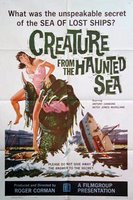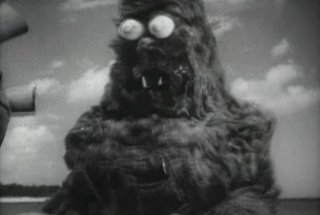Creature from the Haunted Sea
It's been argued that the proliferation of "monster movies" and B-movie science fiction in the 1950s is a symptom of Cold War anxieties. The Thing, Creature From the Black Lagoon, Attack of the Fifty Foot Woman... grotesquerie ruled the roost in the drive-in movie market during the period, inciting and reflecting fears of an unknown, often semi (but not quite) human other. See, for instance, Keith Booker's Monsters, Mushroom Clouds, and the Cold War.
 Creature from the Haunted Sea places its semi-alien creature directly in a Cold War context, with its tale of post-revolutionary Cuba and a vaguely anthropoid sea monster, but without much in the way of discernable anxiety. The film is, rather, a spoof of such paranoia, albeit with the message that paranoids have to be telling the truth at least some of the time, even inadvertently.
Creature from the Haunted Sea places its semi-alien creature directly in a Cold War context, with its tale of post-revolutionary Cuba and a vaguely anthropoid sea monster, but without much in the way of discernable anxiety. The film is, rather, a spoof of such paranoia, albeit with the message that paranoids have to be telling the truth at least some of the time, even inadvertently.
In the end, however, the movie's as much about mass tourism and the end of narratives of heroic individualism as it is about East versus West, capitalism confronting communism.
The plot, such as it is, of this frankly absurd comedy concerns a gang of US freebooters who agree to smuggle out gold from the Cuban treasury for a group of anti-Castro military men, including a General Tostada and a General Cabeza Grande. The gang plans, however, to double-cross the Cubans and take off with the gold themselves. To this end, once they are all at sea their leader, Renzo Capetto, invents a story of a dangerous monster on whom he blames his men's murder of one of the Cuban recruits accompanying the cargo. Little does he know, however, that there is indeed a monster out there, who also seems set on picking off the crew.
In addition to the Cubans, this crew includes Capetto's moll, Mary-belle Monahan, along with her brother, Happy Jack Monahan, plus Capetto's side-kick, Peter Peterson Jr. In addition, a US agent, Sparks Moran, who is also the film's narrator, has somehow added himself to the company.
Fleeing the monster and playing into Capetto's hands, the entire party head to a small, deserted island just of Puerto Rico, where Capetto sinks the boat on a reef, and consigns the box of gold to the bottom of a shallow bay, planning to come back and dive for it later.
Here's where the plot really gets out of hand. It so happens that the Cubans are in fact expert frogmen, and therefore can't be put off so easily. Everyone goes diving, and the freebooters and the monster combine to take them out one by one. On the beach, it turns out that the island is not so deserted: Pete Peterson finds himself a mate who shares his own bizarre skill in imitating animal noises; Happy Jack also brings a woman onto the scene, but she is more interested in Sparks (who in turn is rather more interested in Mary-belle), so Peterson's paramour introduces him to her daughter Mango. To cut an over-long story short, in the end almost everyone gets eaten by the monster, who is left happily playing on the box of gold.
What's most interesting--and also most absurd--is the way in which this desert island on which the last half of the movie is set proves to be far from a pristine paradise. Sparks heads off for a walk and soon comes across a phone built into a cliff-face. He calls a fellow-agent back in Havana, but is unable to say much as shortly someone else (in fact, director Roger Corman in a cameo) is hanging around waiting for his own turn on the phone. Walking away, Sparks then bumps into a gentleman in full business suit tramping around the rockpools as though he were strolling up Wall Street.
Meanwhile, Mango, coerced to hook up with the abandoned Happy Jack, complains (in Spanish, while Happy Jack looks on adoringly and uncomprehendingly) that she is always being forced to do this: "You are very sweet, if a trifle stupid," she tells him. "My mother is always making me take up with weird strangers. It's like a come-on for tourists. She likes for me to heat them up--so she can sell them coconut hats and sandals."
So though the monster appropriates the Cuban renegades' captured loot, an indigenous capitalism is alive and well already in this beach-fringed jungle.
The outlaw gang is completely oblivious to the fact that capital has well and truly preceded their own not-so-triumphant arrival. Indeed, obliviousness and stupidity are the watchwords for all they do. Sparks is wholly incompetent as a secret agent, however much his narrative tells us otherwise. The era of plucky individuals as the advance guard for enterprise is finally what's sent up most comprehensively in this movie. For all their supposed ingenuity (using kitchen plungers as murder weapons, sausages for radio components), the Cubans, Paretto and his gang, and Sparks alike are ultimately half-wits caught between the natives' seduction and the sea creature's predations.
And heck, if this cookie monster creature with table tennis balls for eyes can get the best of you, then you hardly deserve to survive anyhow...

 Creature from the Haunted Sea places its semi-alien creature directly in a Cold War context, with its tale of post-revolutionary Cuba and a vaguely anthropoid sea monster, but without much in the way of discernable anxiety. The film is, rather, a spoof of such paranoia, albeit with the message that paranoids have to be telling the truth at least some of the time, even inadvertently.
Creature from the Haunted Sea places its semi-alien creature directly in a Cold War context, with its tale of post-revolutionary Cuba and a vaguely anthropoid sea monster, but without much in the way of discernable anxiety. The film is, rather, a spoof of such paranoia, albeit with the message that paranoids have to be telling the truth at least some of the time, even inadvertently.In the end, however, the movie's as much about mass tourism and the end of narratives of heroic individualism as it is about East versus West, capitalism confronting communism.
The plot, such as it is, of this frankly absurd comedy concerns a gang of US freebooters who agree to smuggle out gold from the Cuban treasury for a group of anti-Castro military men, including a General Tostada and a General Cabeza Grande. The gang plans, however, to double-cross the Cubans and take off with the gold themselves. To this end, once they are all at sea their leader, Renzo Capetto, invents a story of a dangerous monster on whom he blames his men's murder of one of the Cuban recruits accompanying the cargo. Little does he know, however, that there is indeed a monster out there, who also seems set on picking off the crew.
In addition to the Cubans, this crew includes Capetto's moll, Mary-belle Monahan, along with her brother, Happy Jack Monahan, plus Capetto's side-kick, Peter Peterson Jr. In addition, a US agent, Sparks Moran, who is also the film's narrator, has somehow added himself to the company.
Fleeing the monster and playing into Capetto's hands, the entire party head to a small, deserted island just of Puerto Rico, where Capetto sinks the boat on a reef, and consigns the box of gold to the bottom of a shallow bay, planning to come back and dive for it later.
Here's where the plot really gets out of hand. It so happens that the Cubans are in fact expert frogmen, and therefore can't be put off so easily. Everyone goes diving, and the freebooters and the monster combine to take them out one by one. On the beach, it turns out that the island is not so deserted: Pete Peterson finds himself a mate who shares his own bizarre skill in imitating animal noises; Happy Jack also brings a woman onto the scene, but she is more interested in Sparks (who in turn is rather more interested in Mary-belle), so Peterson's paramour introduces him to her daughter Mango. To cut an over-long story short, in the end almost everyone gets eaten by the monster, who is left happily playing on the box of gold.
What's most interesting--and also most absurd--is the way in which this desert island on which the last half of the movie is set proves to be far from a pristine paradise. Sparks heads off for a walk and soon comes across a phone built into a cliff-face. He calls a fellow-agent back in Havana, but is unable to say much as shortly someone else (in fact, director Roger Corman in a cameo) is hanging around waiting for his own turn on the phone. Walking away, Sparks then bumps into a gentleman in full business suit tramping around the rockpools as though he were strolling up Wall Street.
Meanwhile, Mango, coerced to hook up with the abandoned Happy Jack, complains (in Spanish, while Happy Jack looks on adoringly and uncomprehendingly) that she is always being forced to do this: "You are very sweet, if a trifle stupid," she tells him. "My mother is always making me take up with weird strangers. It's like a come-on for tourists. She likes for me to heat them up--so she can sell them coconut hats and sandals."
So though the monster appropriates the Cuban renegades' captured loot, an indigenous capitalism is alive and well already in this beach-fringed jungle.
The outlaw gang is completely oblivious to the fact that capital has well and truly preceded their own not-so-triumphant arrival. Indeed, obliviousness and stupidity are the watchwords for all they do. Sparks is wholly incompetent as a secret agent, however much his narrative tells us otherwise. The era of plucky individuals as the advance guard for enterprise is finally what's sent up most comprehensively in this movie. For all their supposed ingenuity (using kitchen plungers as murder weapons, sausages for radio components), the Cubans, Paretto and his gang, and Sparks alike are ultimately half-wits caught between the natives' seduction and the sea creature's predations.
And heck, if this cookie monster creature with table tennis balls for eyes can get the best of you, then you hardly deserve to survive anyhow...

Labels: caribbean, geopolitics
